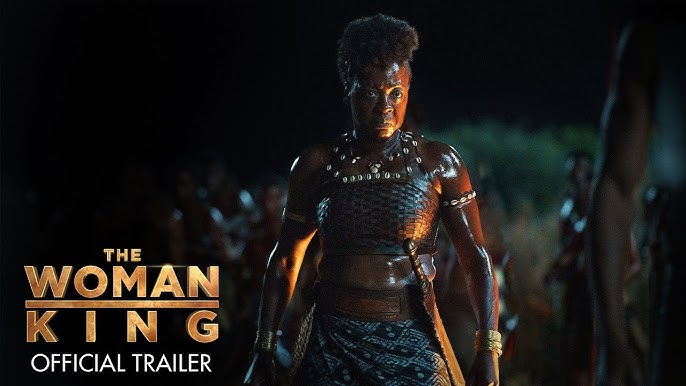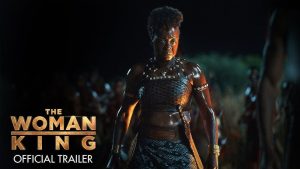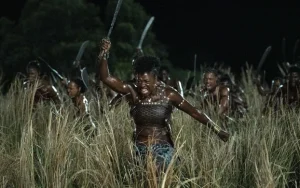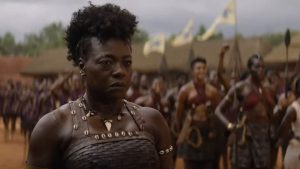“The Woman King (2022)”
- movieslovers
- November 5, 2024

“The Woman King” (2022) is an action-packed historical drama directed by Gina Prince-Bythewood, starring Viola Davis as General Nanisca, the fierce leader of the Agojie, an all-female warrior unit that protected the African Kingdom of Dahomey during the 1820s. Inspired by true events, the film explores themes of empowerment, resilience, and cultural pride, bringing to light a remarkable part of African history that has often been overlooked.
Plot Summary
Set in the Kingdom of Dahomey in West Africa, the story follows the Agojie, a group of elite female warriors known for their combat skills and fearless spirit. The kingdom faces the constant threat of rival kingdoms and the encroachment of European slavers, who aim to exploit Dahomey’s people and resources. General Nanisca (Viola Davis) trains a new generation of recruits to prepare them for battle and to protect their people. Among the new warriors is Nawi (Thuso Mbedu), a young and rebellious recruit who learns the values of honor, loyalty, and sacrifice under Nanisca’s guidance.
As the Agojie prepare to defend their land, Nanisca faces both external enemies and internal conflicts that force her to confront painful memories from her past. The film culminates in a dramatic and intense battle, where the Agojie warriors must put everything on the line to preserve their freedom, identity, and way of life.
Key Themes
- Empowerment and Female Strength: The film celebrates the power, courage, and unity of women who take on traditionally male roles, highlighting themes of resilience, empowerment, and the strength found in sisterhood.
- Colonialism and Resistance: The threat of European colonizers and the transatlantic slave trade is a backdrop to the story, emphasizing the Agojie’s determination to protect their people and culture against external exploitation and oppression.
- Sacrifice and Duty: The Agojie are bound by a code of duty, loyalty, and sacrifice, and each warrior must confront personal challenges to serve the greater good of their kingdom.
- Identity and Cultural Pride: The film showcases the rich culture, traditions, and history of Dahomey, providing a cinematic celebration of African heritage.
Performances
Viola Davis delivers a powerful performance as General Nanisca, portraying her as both a fierce warrior and a woman with emotional depth and complex motivations. Her portrayal is intense and deeply layered, capturing the strength, wisdom, and humanity of her character. Thuso Mbedu, as Nawi, shines as a young recruit who undergoes significant growth, while Lashana Lynch as Izogie and Sheila Atim as Amenza bring additional depth to the ensemble, portraying warriors who each have unique strengths and personalities.
Cinematography and Action
The film’s cinematography by Polly Morgan captures the sweeping landscapes of West Africa with beautiful, vibrant imagery. The action sequences are choreographed with precision, showcasing the Agojie’s fighting style, which combines strength, agility, and tactics rooted in African martial arts. These scenes are both thrilling and intense, adding to the epic scope of the story.
Reception and Legacy
The Woman King received critical acclaim for its storytelling, direction, and performances, particularly praising Viola Davis’s powerful portrayal of Nanisca. Critics and audiences lauded the film for bringing a historical African narrative to the forefront of mainstream cinema, emphasizing themes of empowerment and cultural pride. Its accurate and nuanced portrayal of the Agojie warriors and African heritage resonated strongly, making it a cultural milestone and a fresh addition to the historical drama genre.
Cast and Crew
- Director: Gina Prince-Bythewood
- Writers: Dana Stevens, based on a story by Maria Bello and Dana Stevens
- Cast:
- Viola Davis as General Nanisca
- Thuso Mbedu as Nawi
- Lashana Lynch as Izogie
- Sheila Atim as Amenza
- John Boyega as King Ghezo
- Hero Fiennes Tiffin as Santo Ferreira

Fun Facts
- Viola Davis underwent intense physical training to prepare for the role, including martial arts, weightlifting, and fight choreography.
- The film drew inspiration from real historical events, although certain characters and plot points were fictionalized for storytelling purposes.
- The Woman King was filmed in South Africa, capturing the natural landscapes that brought the kingdom of Dahomey to life.
Conclusion
The Woman King stands as a powerful tribute to the legacy of the Agojie warriors and an inspiring tale of resilience and unity. With stellar performances, stunning visuals, and a compelling story rooted in African history, the film celebrates a narrative of strength, sacrifice, and cultural pride. The Woman King is more than just an action film; it’s a landmark in cinema that brings historical African heroines to the forefront, reminding audiences of the strength of women and the power of cultural identity.











